Unit 3 Could you please tell me where the restrooms are 短文综合填空和阅读理解 专题练 2025-2026学年上期初中英语人教版九年级全册
文档属性
| 名称 | Unit 3 Could you please tell me where the restrooms are 短文综合填空和阅读理解 专题练 2025-2026学年上期初中英语人教版九年级全册 |
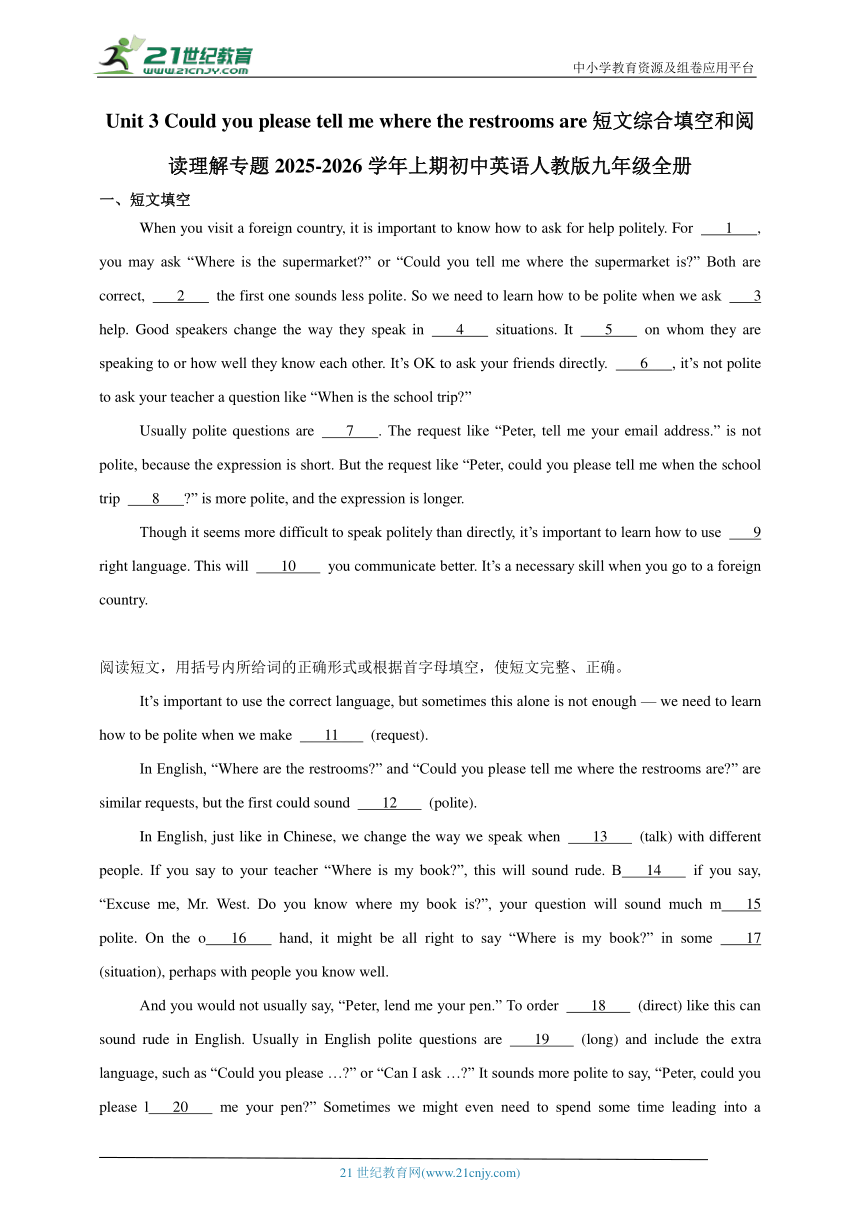
|
|
| 格式 | docx | ||
| 文件大小 | 109.1KB | ||
| 资源类型 | 试卷 | ||
| 版本资源 | 人教新目标(Go for it)版 | ||
| 科目 | 英语 | ||
| 更新时间 | 2025-08-13 00:00:00 | ||
图片预览

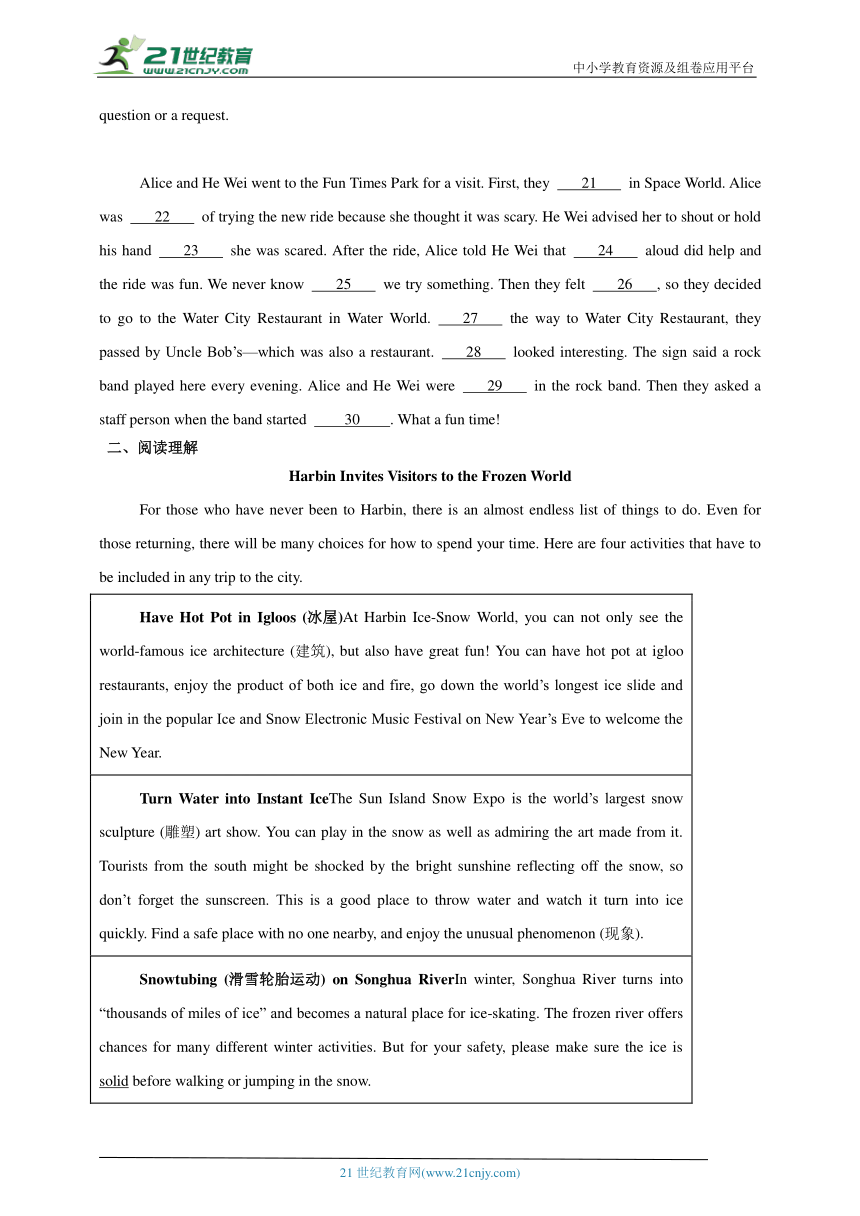
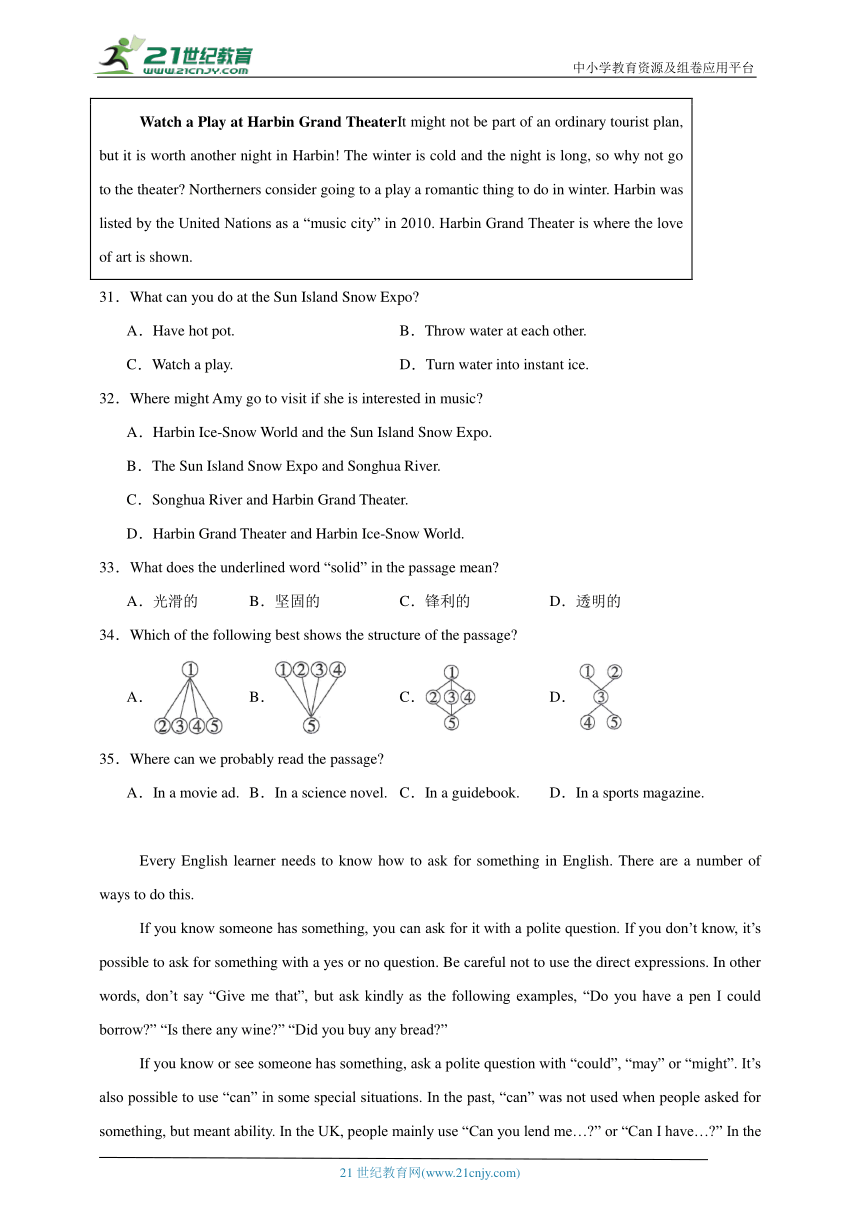
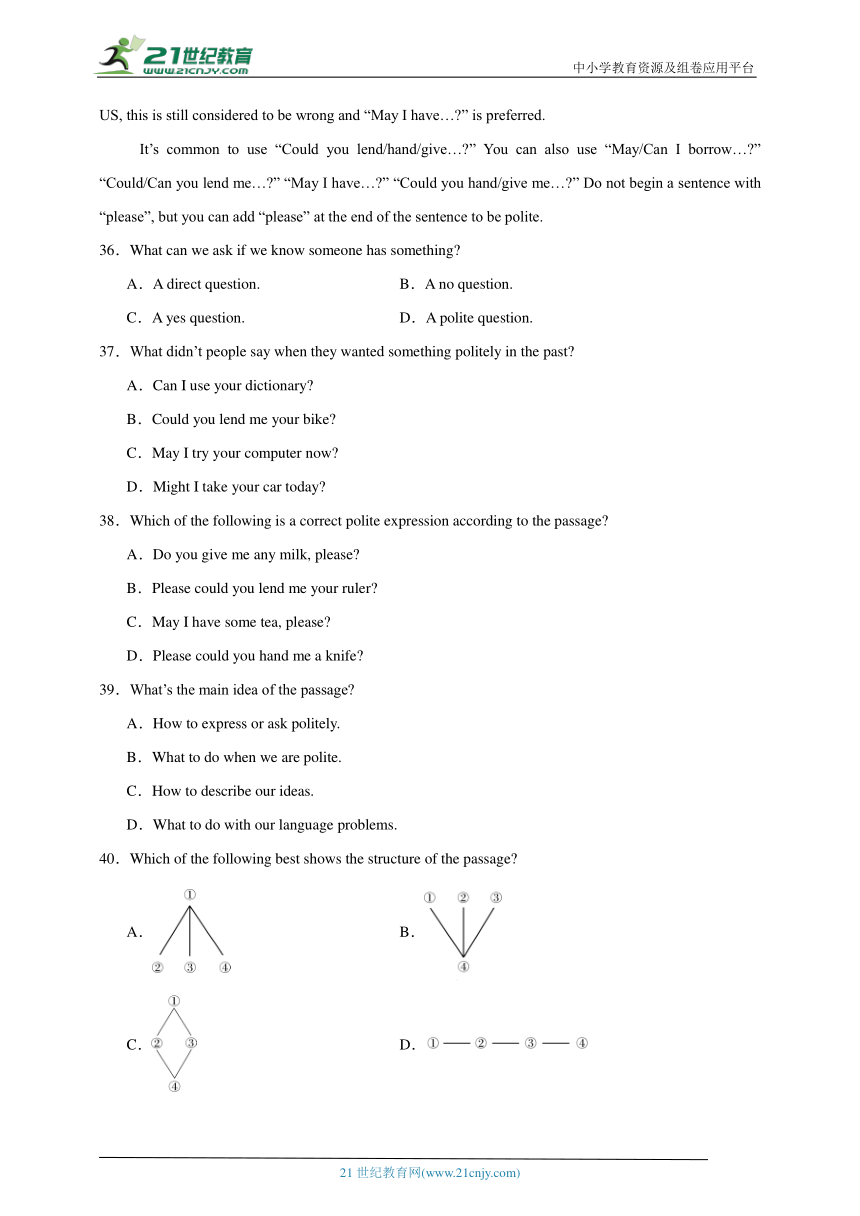
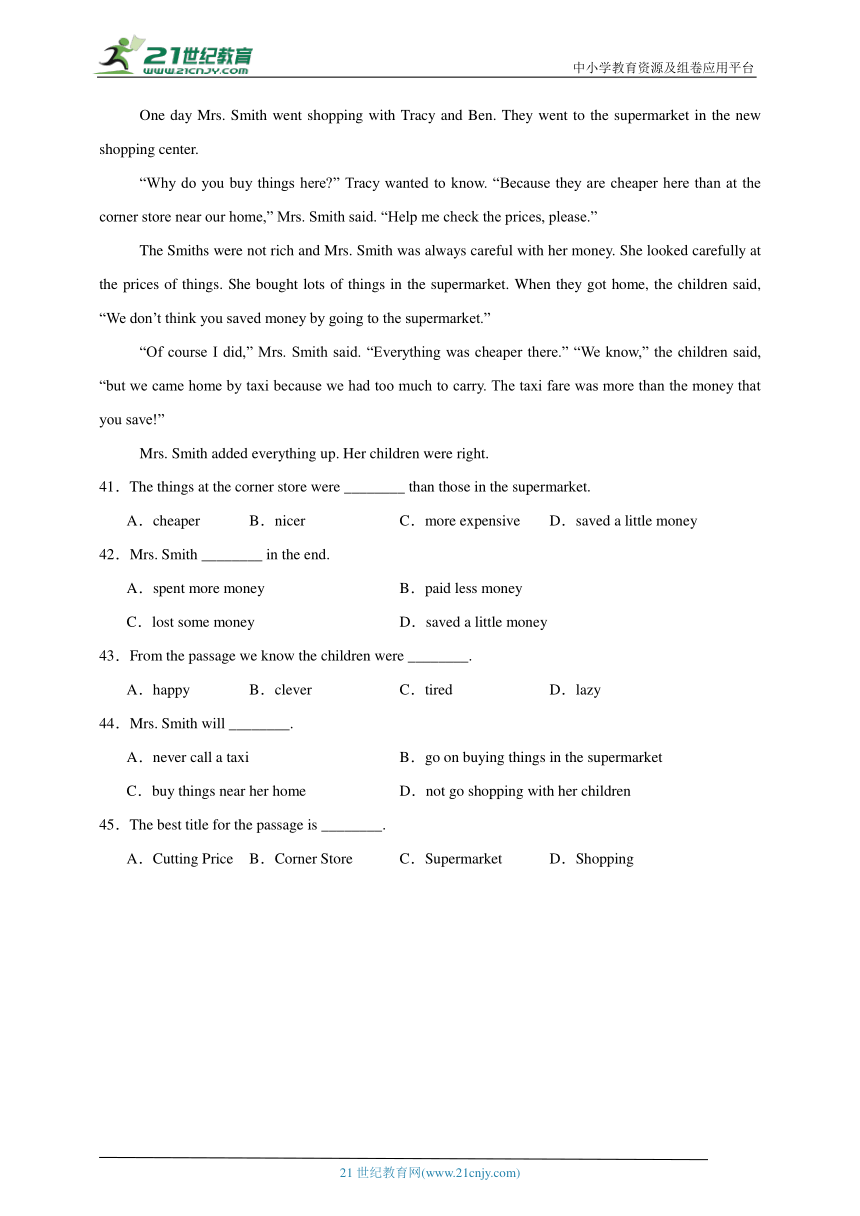
文档简介
中小学教育资源及组卷应用平台
Unit 3 Could you please tell me where the restrooms are短文综合填空和阅读理解专题2025-2026学年上期初中英语人教版九年级全册
一、短文填空
When you visit a foreign country, it is important to know how to ask for help politely. For 1 , you may ask “Where is the supermarket ” or “Could you tell me where the supermarket is ” Both are correct, 2 the first one sounds less polite. So we need to learn how to be polite when we ask 3 help. Good speakers change the way they speak in 4 situations. It 5 on whom they are speaking to or how well they know each other. It’s OK to ask your friends directly. 6 , it’s not polite to ask your teacher a question like “When is the school trip ”
Usually polite questions are 7 . The request like “Peter, tell me your email address.” is not polite, because the expression is short. But the request like “Peter, could you please tell me when the school trip 8 ” is more polite, and the expression is longer.
Though it seems more difficult to speak politely than directly, it’s important to learn how to use 9 right language. This will 10 you communicate better. It’s a necessary skill when you go to a foreign country.
阅读短文,用括号内所给词的正确形式或根据首字母填空,使短文完整、正确。
It’s important to use the correct language, but sometimes this alone is not enough — we need to learn how to be polite when we make 11 (request).
In English, “Where are the restrooms ” and “Could you please tell me where the restrooms are ” are similar requests, but the first could sound 12 (polite).
In English, just like in Chinese, we change the way we speak when 13 (talk) with different people. If you say to your teacher “Where is my book ”, this will sound rude. B 14 if you say, “Excuse me, Mr. West. Do you know where my book is ”, your question will sound much m 15 polite. On the o 16 hand, it might be all right to say “Where is my book ” in some 17 (situation), perhaps with people you know well.
And you would not usually say, “Peter, lend me your pen.” To order 18 (direct) like this can sound rude in English. Usually in English polite questions are 19 (long) and include the extra language, such as “Could you please … ” or “Can I ask … ” It sounds more polite to say, “Peter, could you please l 20 me your pen ” Sometimes we might even need to spend some time leading into a question or a request.
Alice and He Wei went to the Fun Times Park for a visit. First, they 21 in Space World. Alice was 22 of trying the new ride because she thought it was scary. He Wei advised her to shout or hold his hand 23 she was scared. After the ride, Alice told He Wei that 24 aloud did help and the ride was fun. We never know 25 we try something. Then they felt 26 , so they decided to go to the Water City Restaurant in Water World. 27 the way to Water City Restaurant, they passed by Uncle Bob’s—which was also a restaurant. 28 looked interesting. The sign said a rock band played here every evening. Alice and He Wei were 29 in the rock band. Then they asked a staff person when the band started 30 . What a fun time!
二、阅读理解
Harbin Invites Visitors to the Frozen World
For those who have never been to Harbin, there is an almost endless list of things to do. Even for those returning, there will be many choices for how to spend your time. Here are four activities that have to be included in any trip to the city.
Have Hot Pot in Igloos (冰屋)At Harbin Ice-Snow World, you can not only see the world-famous ice architecture (建筑), but also have great fun! You can have hot pot at igloo restaurants, enjoy the product of both ice and fire, go down the world’s longest ice slide and join in the popular Ice and Snow Electronic Music Festival on New Year’s Eve to welcome the New Year.
Turn Water into Instant IceThe Sun Island Snow Expo is the world’s largest snow sculpture (雕塑) art show. You can play in the snow as well as admiring the art made from it. Tourists from the south might be shocked by the bright sunshine reflecting off the snow, so don’t forget the sunscreen. This is a good place to throw water and watch it turn into ice quickly. Find a safe place with no one nearby, and enjoy the unusual phenomenon (现象).
Snowtubing (滑雪轮胎运动) on Songhua RiverIn winter, Songhua River turns into “thousands of miles of ice” and becomes a natural place for ice-skating. The frozen river offers chances for many different winter activities. But for your safety, please make sure the ice is solid before walking or jumping in the snow.
Watch a Play at Harbin Grand TheaterIt might not be part of an ordinary tourist plan, but it is worth another night in Harbin! The winter is cold and the night is long, so why not go to the theater Northerners consider going to a play a romantic thing to do in winter. Harbin was listed by the United Nations as a “music city” in 2010. Harbin Grand Theater is where the love of art is shown.
31.What can you do at the Sun Island Snow Expo
A.Have hot pot. B.Throw water at each other.
C.Watch a play. D.Turn water into instant ice.
32.Where might Amy go to visit if she is interested in music
A.Harbin Ice-Snow World and the Sun Island Snow Expo.
B.The Sun Island Snow Expo and Songhua River.
C.Songhua River and Harbin Grand Theater.
D.Harbin Grand Theater and Harbin Ice-Snow World.
33.What does the underlined word “solid” in the passage mean
A.光滑的 B.坚固的 C.锋利的 D.透明的
34.Which of the following best shows the structure of the passage
A. B. C. D.
35.Where can we probably read the passage
A.In a movie ad. B.In a science novel. C.In a guidebook. D.In a sports magazine.
Every English learner needs to know how to ask for something in English. There are a number of ways to do this.
If you know someone has something, you can ask for it with a polite question. If you don’t know, it’s possible to ask for something with a yes or no question. Be careful not to use the direct expressions. In other words, don’t say “Give me that”, but ask kindly as the following examples, “Do you have a pen I could borrow ” “Is there any wine ” “Did you buy any bread ”
If you know or see someone has something, ask a polite question with “could”, “may” or “might”. It’s also possible to use “can” in some special situations. In the past, “can” was not used when people asked for something, but meant ability. In the UK, people mainly use “Can you lend me… ” or “Can I have… ” In the US, this is still considered to be wrong and “May I have… ” is preferred.
It’s common to use “Could you lend/hand/give… ” You can also use “May/Can I borrow… ” “Could/Can you lend me… ” “May I have… ” “Could you hand/give me… ” Do not begin a sentence with “please”, but you can add “please” at the end of the sentence to be polite.
36.What can we ask if we know someone has something
A.A direct question. B.A no question.
C.A yes question. D.A polite question.
37.What didn’t people say when they wanted something politely in the past
A.Can I use your dictionary
B.Could you lend me your bike
C.May I try your computer now
D.Might I take your car today
38.Which of the following is a correct polite expression according to the passage
A.Do you give me any milk, please
B.Please could you lend me your ruler
C.May I have some tea, please
D.Please could you hand me a knife
39.What’s the main idea of the passage
A.How to express or ask politely.
B.What to do when we are polite.
C.How to describe our ideas.
D.What to do with our language problems.
40.Which of the following best shows the structure of the passage
A. B.
C. D.
One day Mrs. Smith went shopping with Tracy and Ben. They went to the supermarket in the new shopping center.
“Why do you buy things here ” Tracy wanted to know. “Because they are cheaper here than at the corner store near our home,” Mrs. Smith said. “Help me check the prices, please.”
The Smiths were not rich and Mrs. Smith was always careful with her money. She looked carefully at the prices of things. She bought lots of things in the supermarket. When they got home, the children said, “We don’t think you saved money by going to the supermarket.”
“Of course I did,” Mrs. Smith said. “Everything was cheaper there.” “We know,” the children said, “but we came home by taxi because we had too much to carry. The taxi fare was more than the money that you save!”
Mrs. Smith added everything up. Her children were right.
41.The things at the corner store were ________ than those in the supermarket.
A.cheaper B.nicer C.more expensive D.saved a little money
42.Mrs. Smith ________ in the end.
A.spent more money B.paid less money
C.lost some money D.saved a little money
43.From the passage we know the children were ________.
A.happy B.clever C.tired D.lazy
44.Mrs. Smith will ________.
A.never call a taxi B.go on buying things in the supermarket
C.buy things near her home D.not go shopping with her children
45.The best title for the passage is ________.
A.Cutting Price B.Corner Store C.Supermarket D.Shopping
参考答案
题号 31 32 33 34 35 36 37 38 39 40
答案 D D B A C D A C A A
题号 41 42 43 44 45
答案 C A B C D
1.example 2.but 3.for 4.different 5.depends 6.However 7.longer 8.is 9.the 10.help
【导语】本文主要讲述了如何礼貌地寻求帮助。
1.句意:例如,你可能会问“超市在哪里?”或者“你能告诉我超市在哪里吗?”结合空前的For和“you may ask ‘Where is the supermarket ’ or ‘Could you tell me where the supermarket is ’”可知,空后在举例,所以空处应填example,构成短语for example“例如”。故填example。
2.句意:两句都是正确的,但第一句听起来不太礼貌。分析“Both are correct...the first one sounds less polite.”可知,前后句是转折关系,连词but“但是”符合语境。故填but。
3.句意:所以我们需要学会当我们寻求帮助时如何变得有礼貌。根据“when we ask...help”可知,本题考查短语ask for help“寻求帮助”。故填for。
4.句意:优秀的说话者会在不同的情况下改变他们说话的方式。分析“Good speakers change the way they speak in...situations.”可知,此处表示在不同的情况下,短语in different situations意为“在不同的情况下”。故填different。
5.句意:这取决于他们在和谁说话,或者他们彼此有多了解。分析“It...on whom they are speaking to”可知,本题考查动词短语depend on“取决于”,此处表示现在所存在的情况,应用一般现在时,主语It表示单数,所以depend要变成第三人称单数形式depends。故填depends。
6.句意:然而,问老师类似“学校旅行是什么时候?”这样的问题是不礼貌的。分析“It’s OK to ask your friends directly...it’s not polite to ask your teacher a question like ‘When is the school trip ’”可知,空处前后是转折关系,结合空处在句中的位置和空后的逗号可知,空处应用however“然而”表示转折,句首首字母h要大写。故填However。
7.句意:通常礼貌的问题会更长。根据下文“But the request like...is more polite, and the expression is longer.”可知,此处表示通常礼貌的问题会更长。空处应填比较级longer。故填longer。
8.句意:彼得,你能告诉我学校旅行是什么时候吗?分析“could you please tell me when the school trip... ”可知,空处是be动词,结合语境可知,时态是一般现在时,从句主语the school trip表示单数,所以应用be动词is。故填is。
9.句意:虽然礼貌地说话似乎比直白地说话更难,但学会如何使用正确的语言是很重要的。此处表示特指,应用定冠词the。故填the。
10.句意:这会帮助你更好地沟通。分析“This will...you communicate better.”可知,空处意为“帮助”,动词help符合语境,will后接动词原形。故填help。
11.requests 12.impolite 13.talking 14.(B)ut 15.(m)ore 16.(o)ther 17.situations 18.directly 19.longer 20.(l)end
【导语】本文是一篇说明文,介绍了英语口语交际中如何得体和礼貌地表达请求。
11.句意:使用正确的语言是很重要的,但有时单凭这一点是不够的——我们需要学会如何在提出要求时保持礼貌。make后面应接名词,request“请求”是可数名词,此处表示泛指,应用复数。故填requests。
12.句意:在英语中,“洗手间在哪里 ”和“你能告诉我洗手间在哪里吗?”都是类似的请求,但第一个听起来可能不礼貌。sound为连系动词,后接形容词作表语,第一个请求“Where are the restrooms ”是相对更直接的请求,不够委婉,因此听起来不礼貌。sound是系动词,后面应接形容词,polite表示“礼貌的”,此处应填反义词impolite“不礼貌的”。故填impolite.
13.句意:在英语中,就像在汉语中一样,当我们与不同的人交谈时,我们会改变我们说话的方式。when表示“当……时”,talk是动词,when后面所接动词应改为动名词形式,故填talking。
14.句意:但如果你说:“打扰一下,韦斯特先生。你知道我的书在哪里吗?”,你的问题听起来会显得礼貌多了。前文举出谈话时欠缺礼貌的表达“Where is my book ”,本句举出礼貌的表达“Excuse me, Mr. West. Do you know where my book is ”,前后是转折关系,结合首字母提示,应填but(但是)。故填(B)ut。
15.句意:但如果你说:“打扰一下,韦斯特先生。你知道我的书在哪里吗?”,你的问题听起来会显得礼貌多了。本句举出礼貌的表达“Excuse me, Mr. West. Do you know where my book is ”,表明这样说听起来礼貌多了,much修饰形容词比较级,根据首字母提示,应填more(更加)。故填(m)ore。
16.句意:另一方面,也许在某些情况下对你很熟悉的人说“我的书在哪里?”也是妥当的。根据首字母提示,这里应是固定短语on the other hand,表示“另一方面”。故填(o)ther。
17.句意:另一方面,也许在某些情况下对你很熟悉的人说“我的书在哪里?”也是妥当的。some后面应接可数名词复数,situation“情况”为可数名词,in some situations为固定短语,表示“在某些情况下”。故填situations。
18.句意:像这样直接给出命令在英语中听起来很粗鲁。分析句子结构可知,空格处应是副词修饰order,表示直接地命令。direct“直接的”是形容词,副词形式为directly“直接地”。故填directly。
19.句意:在英语中,礼貌提问的句子通常较长,并且包含额外的语言,例如“请问你可以……吗 ”或者“我能问一下……吗 ”根据“include the extra language”和句子中举出的例子可知,在英语中礼貌提问的句子包含额外的语言,通常较长。空格处应填形容词比较级,long“长的”,其比较级为longer“更长的”。故填longer。
20.句意:“彼得,你能把笔借给我吗 ”这样说听起来更礼貌些。根据前文“Peter, lend me your pen.”可知,本段针对这一句话,对如何礼貌表达请求展开说明,本句是关于借笔的礼貌请求,lend表示“借”,could后面应接动词原形。故填(l)end。
21.arrived 22.afraid 23.when/if 24.shouting 25.until 26.hungry 27.On 28.It 29.interested 30.playing
【导语】本文是一篇记叙文。文章主要讲述了Alice和He Wei在快乐时光公园游玩的经历。
21.句意:首先,他们到达了太空世界。根据空后介词“in”可知,此处是指到达太空世界,考查arrive in“到达”,动词短语;句子时态为一般过去时,谓语动词应用过去式arrived。故填arrived。
22.句意:Alice害怕尝试新乘骑项目,因为她觉得很吓人。根据下文“because she thought it was scary”可知,此处是指Alice害怕新乘骑项目,考查be afraid of“害怕”,形容词短语。故填afraid。
23.句意:He Wei建议她在害怕的时候大声喊叫或握住他的手。分析句子结构可知,“she was scared”为大声喊叫或者握手的时间或者条件,应用when或者if引导状语从句。故填when/if。
24.句意:骑完之后,Alice告诉He Wei,大声喊叫确实有帮助,而且乘骑项目很有趣。根据上文“to shout”可知,此处是指大声喊叫确实有帮助,考查shout“喊叫”,动词;分析句子结构可知,此处应用动名词形式shouting作从句的主语。故填shouting。
25.句意:直到尝试过我们才会知道。根据“We never know … we try something.”可知,此处是指尝试后才会知道,考查until“直到……才”,连词,引导时间状语从句。故填until。
26.句意:然后他们觉得饿了,所以他们决定去水世界的水城餐厅。根据下文“go to the Water City Restaurant”可知,此处是指他们感到饿了,考查hungry“饥饿的”,形容词,在句中作表语。故填hungry。
27.句意:在去水城餐厅的路上,他们经过了鲍勃叔叔餐厅,那也是一家餐厅。根据空后“the way to…”可知,此处考查on the way to“在去……的路上”,固定搭配,介词on位于句首,首字母要大写。故填On。
28.句意:它看起来很有趣。根据上文“they passed by Uncle Bob’s—which was also a restaurant”可知,此处用人称代词主格it指代“Uncle Bob’s”,句首首字母要大写。故填It。
29.句意:Alice和He Wei对摇滚乐队很感兴趣。根据下文“they asked a staff person”可知,此处是指他们对乐队感兴趣,考查be interested in“对……感兴趣”,形容词短语。故填interested。
30.句意:然后他们问一个工作人员乐队什么时候开始演奏。根据上文“a rock band played here every evening”可知,此处是指询问乐队开始演出的时间,考查play“演出”,动词;根据空前“started”可知,这里考查start doing sth.“开始做某事”,应用动名词形式playing作宾语。故填playing。
31.D 32.D 33.B 34.A 35.C
【导语】本文是一篇应用文。文章介绍去哈尔滨旅游可以进行的四项活动。
31.细节理解题。根据“Turn Water into Instant Ice”下的“The Sun Island Snow Expo is the world’s largest snow sculpture (雕塑) art show.…This is a good place to throw water and watch it turn into ice quickly.”可知,在太阳岛冰雪博览会上,我们可以把水快速变成冰。故选D。
32.细节理解题。根据“At Harbin Ice-Snow World…join in the popular Ice and Snow Electronic Music Festival on New Year’s Eve to welcome the New Year.”以及“ Harbin was listed by the United Nations as a “music city” in 2010. Harbin Grand Theater is where the love of art is shown.”可知,如果艾米对音乐感兴趣,她会去哈尔滨大剧院和哈尔滨冰雪大世界。故选D。
33.词句猜测题。根据“But for your safety, please make sure the ice is solid before walking or jumping in the snow.”的句意可知,此处表示的是但为了您的安全,在雪地里行走或跳跃之前,请确保冰是坚实的。solid意为“坚固的”。故选B。
34.篇章结构题。根据“For those who have never been to Harbin, there is an almost endless list of things to do. Even for those returning, there will be many choices for how to spend your time. Here are four activities that have to be included in any trip to the city.”可知,第一段是总体概述,2到5段是分说。故选A。
35.推理判断题。文章介绍去哈尔滨旅游可以进行的四项活动,所以我们能在旅行指南中看到这篇文章。故选C。
36.D 37.A 38.C 39.A 40.A
【导语】本文主要介绍如何礼貌地问或索要东西。
36.细节理解题。根据“If you know someone has something, you can ask for it with a polite question.”可知,如果知道某人有某物,可以用礼貌的问题来询问。故选D。
37.推理判断题。根据“In the past, ‘can’ was not used when people asked for something, but meant ability. ”可知,在过去,can不是用来索要某物,而是用来表示能力,因此,人们不会用 “Can I use your dictionary ”。故选A。
38.推理判断题。根据第三段第一句 “If you know or see someone has something, ask a polite question with ‘could’,’may’ or ‘might’”可知,礼貌的问句中使用could, may或者might, 排除A项;根据最后一段最后一句中 “but you can add ‘please’ at the end of the sentence to be polite. ”可知,在句子的末尾用please表示礼貌,排除B和D选项。C选项“May I try your computer now ”表述礼貌。故选 C。
39.主旨大意题。根据第一段 “Every English learner needs to know how to ask for something in English. There are a number of ways to do this. ”可知,文章主要讲述在英语中应该怎样礼貌地表达或询问。故选A。
40.篇章结构题。文章第一段是总述,引出话题,第二、三、四段分述用英语索要物品的方式。故选A。
41.C 42.A 43.B 44.C 45.D
【导语】本文主要描述了史密斯夫人的一次购物的经历,虽然超市的东西价格便宜,但是要算上车费,并不省钱。
41.细节理解题。根据“Because they are cheaper here than at the corner store near our home”可知比家附近的街角商店便宜,说明家附近的商店更贵。故选C。
42.细节理解题。根据“but we came home by taxi because we had too much to carry. The taxi fare was more than the money that you save!”以及“Mrs. Smith added everything up. Her children were right.”可知他们并没有节约到钱,反而花费在出租车上的钱超过了买东西节约的钱。故选A。
43.推理判断题。根据“Mrs. Smith added everything up. Her children were right.”可知她的孩子很聪明,故选B。
44.推理判断题。根据“Mrs. Smith added everything up. Her children were right.”可知他们跑远的地方买东西并没有节约到钱,可推测史密斯夫人往后会在家附近买东西。故选C。
45.最佳标题题。本文主要描述了史密斯夫人的一次购物的经历。故选D。
21世纪教育网 www.21cnjy.com 精品试卷·第 2 页 (共 2 页)
21世纪教育网(www.21cnjy.com)
Unit 3 Could you please tell me where the restrooms are短文综合填空和阅读理解专题2025-2026学年上期初中英语人教版九年级全册
一、短文填空
When you visit a foreign country, it is important to know how to ask for help politely. For 1 , you may ask “Where is the supermarket ” or “Could you tell me where the supermarket is ” Both are correct, 2 the first one sounds less polite. So we need to learn how to be polite when we ask 3 help. Good speakers change the way they speak in 4 situations. It 5 on whom they are speaking to or how well they know each other. It’s OK to ask your friends directly. 6 , it’s not polite to ask your teacher a question like “When is the school trip ”
Usually polite questions are 7 . The request like “Peter, tell me your email address.” is not polite, because the expression is short. But the request like “Peter, could you please tell me when the school trip 8 ” is more polite, and the expression is longer.
Though it seems more difficult to speak politely than directly, it’s important to learn how to use 9 right language. This will 10 you communicate better. It’s a necessary skill when you go to a foreign country.
阅读短文,用括号内所给词的正确形式或根据首字母填空,使短文完整、正确。
It’s important to use the correct language, but sometimes this alone is not enough — we need to learn how to be polite when we make 11 (request).
In English, “Where are the restrooms ” and “Could you please tell me where the restrooms are ” are similar requests, but the first could sound 12 (polite).
In English, just like in Chinese, we change the way we speak when 13 (talk) with different people. If you say to your teacher “Where is my book ”, this will sound rude. B 14 if you say, “Excuse me, Mr. West. Do you know where my book is ”, your question will sound much m 15 polite. On the o 16 hand, it might be all right to say “Where is my book ” in some 17 (situation), perhaps with people you know well.
And you would not usually say, “Peter, lend me your pen.” To order 18 (direct) like this can sound rude in English. Usually in English polite questions are 19 (long) and include the extra language, such as “Could you please … ” or “Can I ask … ” It sounds more polite to say, “Peter, could you please l 20 me your pen ” Sometimes we might even need to spend some time leading into a question or a request.
Alice and He Wei went to the Fun Times Park for a visit. First, they 21 in Space World. Alice was 22 of trying the new ride because she thought it was scary. He Wei advised her to shout or hold his hand 23 she was scared. After the ride, Alice told He Wei that 24 aloud did help and the ride was fun. We never know 25 we try something. Then they felt 26 , so they decided to go to the Water City Restaurant in Water World. 27 the way to Water City Restaurant, they passed by Uncle Bob’s—which was also a restaurant. 28 looked interesting. The sign said a rock band played here every evening. Alice and He Wei were 29 in the rock band. Then they asked a staff person when the band started 30 . What a fun time!
二、阅读理解
Harbin Invites Visitors to the Frozen World
For those who have never been to Harbin, there is an almost endless list of things to do. Even for those returning, there will be many choices for how to spend your time. Here are four activities that have to be included in any trip to the city.
Have Hot Pot in Igloos (冰屋)At Harbin Ice-Snow World, you can not only see the world-famous ice architecture (建筑), but also have great fun! You can have hot pot at igloo restaurants, enjoy the product of both ice and fire, go down the world’s longest ice slide and join in the popular Ice and Snow Electronic Music Festival on New Year’s Eve to welcome the New Year.
Turn Water into Instant IceThe Sun Island Snow Expo is the world’s largest snow sculpture (雕塑) art show. You can play in the snow as well as admiring the art made from it. Tourists from the south might be shocked by the bright sunshine reflecting off the snow, so don’t forget the sunscreen. This is a good place to throw water and watch it turn into ice quickly. Find a safe place with no one nearby, and enjoy the unusual phenomenon (现象).
Snowtubing (滑雪轮胎运动) on Songhua RiverIn winter, Songhua River turns into “thousands of miles of ice” and becomes a natural place for ice-skating. The frozen river offers chances for many different winter activities. But for your safety, please make sure the ice is solid before walking or jumping in the snow.
Watch a Play at Harbin Grand TheaterIt might not be part of an ordinary tourist plan, but it is worth another night in Harbin! The winter is cold and the night is long, so why not go to the theater Northerners consider going to a play a romantic thing to do in winter. Harbin was listed by the United Nations as a “music city” in 2010. Harbin Grand Theater is where the love of art is shown.
31.What can you do at the Sun Island Snow Expo
A.Have hot pot. B.Throw water at each other.
C.Watch a play. D.Turn water into instant ice.
32.Where might Amy go to visit if she is interested in music
A.Harbin Ice-Snow World and the Sun Island Snow Expo.
B.The Sun Island Snow Expo and Songhua River.
C.Songhua River and Harbin Grand Theater.
D.Harbin Grand Theater and Harbin Ice-Snow World.
33.What does the underlined word “solid” in the passage mean
A.光滑的 B.坚固的 C.锋利的 D.透明的
34.Which of the following best shows the structure of the passage
A. B. C. D.
35.Where can we probably read the passage
A.In a movie ad. B.In a science novel. C.In a guidebook. D.In a sports magazine.
Every English learner needs to know how to ask for something in English. There are a number of ways to do this.
If you know someone has something, you can ask for it with a polite question. If you don’t know, it’s possible to ask for something with a yes or no question. Be careful not to use the direct expressions. In other words, don’t say “Give me that”, but ask kindly as the following examples, “Do you have a pen I could borrow ” “Is there any wine ” “Did you buy any bread ”
If you know or see someone has something, ask a polite question with “could”, “may” or “might”. It’s also possible to use “can” in some special situations. In the past, “can” was not used when people asked for something, but meant ability. In the UK, people mainly use “Can you lend me… ” or “Can I have… ” In the US, this is still considered to be wrong and “May I have… ” is preferred.
It’s common to use “Could you lend/hand/give… ” You can also use “May/Can I borrow… ” “Could/Can you lend me… ” “May I have… ” “Could you hand/give me… ” Do not begin a sentence with “please”, but you can add “please” at the end of the sentence to be polite.
36.What can we ask if we know someone has something
A.A direct question. B.A no question.
C.A yes question. D.A polite question.
37.What didn’t people say when they wanted something politely in the past
A.Can I use your dictionary
B.Could you lend me your bike
C.May I try your computer now
D.Might I take your car today
38.Which of the following is a correct polite expression according to the passage
A.Do you give me any milk, please
B.Please could you lend me your ruler
C.May I have some tea, please
D.Please could you hand me a knife
39.What’s the main idea of the passage
A.How to express or ask politely.
B.What to do when we are polite.
C.How to describe our ideas.
D.What to do with our language problems.
40.Which of the following best shows the structure of the passage
A. B.
C. D.
One day Mrs. Smith went shopping with Tracy and Ben. They went to the supermarket in the new shopping center.
“Why do you buy things here ” Tracy wanted to know. “Because they are cheaper here than at the corner store near our home,” Mrs. Smith said. “Help me check the prices, please.”
The Smiths were not rich and Mrs. Smith was always careful with her money. She looked carefully at the prices of things. She bought lots of things in the supermarket. When they got home, the children said, “We don’t think you saved money by going to the supermarket.”
“Of course I did,” Mrs. Smith said. “Everything was cheaper there.” “We know,” the children said, “but we came home by taxi because we had too much to carry. The taxi fare was more than the money that you save!”
Mrs. Smith added everything up. Her children were right.
41.The things at the corner store were ________ than those in the supermarket.
A.cheaper B.nicer C.more expensive D.saved a little money
42.Mrs. Smith ________ in the end.
A.spent more money B.paid less money
C.lost some money D.saved a little money
43.From the passage we know the children were ________.
A.happy B.clever C.tired D.lazy
44.Mrs. Smith will ________.
A.never call a taxi B.go on buying things in the supermarket
C.buy things near her home D.not go shopping with her children
45.The best title for the passage is ________.
A.Cutting Price B.Corner Store C.Supermarket D.Shopping
参考答案
题号 31 32 33 34 35 36 37 38 39 40
答案 D D B A C D A C A A
题号 41 42 43 44 45
答案 C A B C D
1.example 2.but 3.for 4.different 5.depends 6.However 7.longer 8.is 9.the 10.help
【导语】本文主要讲述了如何礼貌地寻求帮助。
1.句意:例如,你可能会问“超市在哪里?”或者“你能告诉我超市在哪里吗?”结合空前的For和“you may ask ‘Where is the supermarket ’ or ‘Could you tell me where the supermarket is ’”可知,空后在举例,所以空处应填example,构成短语for example“例如”。故填example。
2.句意:两句都是正确的,但第一句听起来不太礼貌。分析“Both are correct...the first one sounds less polite.”可知,前后句是转折关系,连词but“但是”符合语境。故填but。
3.句意:所以我们需要学会当我们寻求帮助时如何变得有礼貌。根据“when we ask...help”可知,本题考查短语ask for help“寻求帮助”。故填for。
4.句意:优秀的说话者会在不同的情况下改变他们说话的方式。分析“Good speakers change the way they speak in...situations.”可知,此处表示在不同的情况下,短语in different situations意为“在不同的情况下”。故填different。
5.句意:这取决于他们在和谁说话,或者他们彼此有多了解。分析“It...on whom they are speaking to”可知,本题考查动词短语depend on“取决于”,此处表示现在所存在的情况,应用一般现在时,主语It表示单数,所以depend要变成第三人称单数形式depends。故填depends。
6.句意:然而,问老师类似“学校旅行是什么时候?”这样的问题是不礼貌的。分析“It’s OK to ask your friends directly...it’s not polite to ask your teacher a question like ‘When is the school trip ’”可知,空处前后是转折关系,结合空处在句中的位置和空后的逗号可知,空处应用however“然而”表示转折,句首首字母h要大写。故填However。
7.句意:通常礼貌的问题会更长。根据下文“But the request like...is more polite, and the expression is longer.”可知,此处表示通常礼貌的问题会更长。空处应填比较级longer。故填longer。
8.句意:彼得,你能告诉我学校旅行是什么时候吗?分析“could you please tell me when the school trip... ”可知,空处是be动词,结合语境可知,时态是一般现在时,从句主语the school trip表示单数,所以应用be动词is。故填is。
9.句意:虽然礼貌地说话似乎比直白地说话更难,但学会如何使用正确的语言是很重要的。此处表示特指,应用定冠词the。故填the。
10.句意:这会帮助你更好地沟通。分析“This will...you communicate better.”可知,空处意为“帮助”,动词help符合语境,will后接动词原形。故填help。
11.requests 12.impolite 13.talking 14.(B)ut 15.(m)ore 16.(o)ther 17.situations 18.directly 19.longer 20.(l)end
【导语】本文是一篇说明文,介绍了英语口语交际中如何得体和礼貌地表达请求。
11.句意:使用正确的语言是很重要的,但有时单凭这一点是不够的——我们需要学会如何在提出要求时保持礼貌。make后面应接名词,request“请求”是可数名词,此处表示泛指,应用复数。故填requests。
12.句意:在英语中,“洗手间在哪里 ”和“你能告诉我洗手间在哪里吗?”都是类似的请求,但第一个听起来可能不礼貌。sound为连系动词,后接形容词作表语,第一个请求“Where are the restrooms ”是相对更直接的请求,不够委婉,因此听起来不礼貌。sound是系动词,后面应接形容词,polite表示“礼貌的”,此处应填反义词impolite“不礼貌的”。故填impolite.
13.句意:在英语中,就像在汉语中一样,当我们与不同的人交谈时,我们会改变我们说话的方式。when表示“当……时”,talk是动词,when后面所接动词应改为动名词形式,故填talking。
14.句意:但如果你说:“打扰一下,韦斯特先生。你知道我的书在哪里吗?”,你的问题听起来会显得礼貌多了。前文举出谈话时欠缺礼貌的表达“Where is my book ”,本句举出礼貌的表达“Excuse me, Mr. West. Do you know where my book is ”,前后是转折关系,结合首字母提示,应填but(但是)。故填(B)ut。
15.句意:但如果你说:“打扰一下,韦斯特先生。你知道我的书在哪里吗?”,你的问题听起来会显得礼貌多了。本句举出礼貌的表达“Excuse me, Mr. West. Do you know where my book is ”,表明这样说听起来礼貌多了,much修饰形容词比较级,根据首字母提示,应填more(更加)。故填(m)ore。
16.句意:另一方面,也许在某些情况下对你很熟悉的人说“我的书在哪里?”也是妥当的。根据首字母提示,这里应是固定短语on the other hand,表示“另一方面”。故填(o)ther。
17.句意:另一方面,也许在某些情况下对你很熟悉的人说“我的书在哪里?”也是妥当的。some后面应接可数名词复数,situation“情况”为可数名词,in some situations为固定短语,表示“在某些情况下”。故填situations。
18.句意:像这样直接给出命令在英语中听起来很粗鲁。分析句子结构可知,空格处应是副词修饰order,表示直接地命令。direct“直接的”是形容词,副词形式为directly“直接地”。故填directly。
19.句意:在英语中,礼貌提问的句子通常较长,并且包含额外的语言,例如“请问你可以……吗 ”或者“我能问一下……吗 ”根据“include the extra language”和句子中举出的例子可知,在英语中礼貌提问的句子包含额外的语言,通常较长。空格处应填形容词比较级,long“长的”,其比较级为longer“更长的”。故填longer。
20.句意:“彼得,你能把笔借给我吗 ”这样说听起来更礼貌些。根据前文“Peter, lend me your pen.”可知,本段针对这一句话,对如何礼貌表达请求展开说明,本句是关于借笔的礼貌请求,lend表示“借”,could后面应接动词原形。故填(l)end。
21.arrived 22.afraid 23.when/if 24.shouting 25.until 26.hungry 27.On 28.It 29.interested 30.playing
【导语】本文是一篇记叙文。文章主要讲述了Alice和He Wei在快乐时光公园游玩的经历。
21.句意:首先,他们到达了太空世界。根据空后介词“in”可知,此处是指到达太空世界,考查arrive in“到达”,动词短语;句子时态为一般过去时,谓语动词应用过去式arrived。故填arrived。
22.句意:Alice害怕尝试新乘骑项目,因为她觉得很吓人。根据下文“because she thought it was scary”可知,此处是指Alice害怕新乘骑项目,考查be afraid of“害怕”,形容词短语。故填afraid。
23.句意:He Wei建议她在害怕的时候大声喊叫或握住他的手。分析句子结构可知,“she was scared”为大声喊叫或者握手的时间或者条件,应用when或者if引导状语从句。故填when/if。
24.句意:骑完之后,Alice告诉He Wei,大声喊叫确实有帮助,而且乘骑项目很有趣。根据上文“to shout”可知,此处是指大声喊叫确实有帮助,考查shout“喊叫”,动词;分析句子结构可知,此处应用动名词形式shouting作从句的主语。故填shouting。
25.句意:直到尝试过我们才会知道。根据“We never know … we try something.”可知,此处是指尝试后才会知道,考查until“直到……才”,连词,引导时间状语从句。故填until。
26.句意:然后他们觉得饿了,所以他们决定去水世界的水城餐厅。根据下文“go to the Water City Restaurant”可知,此处是指他们感到饿了,考查hungry“饥饿的”,形容词,在句中作表语。故填hungry。
27.句意:在去水城餐厅的路上,他们经过了鲍勃叔叔餐厅,那也是一家餐厅。根据空后“the way to…”可知,此处考查on the way to“在去……的路上”,固定搭配,介词on位于句首,首字母要大写。故填On。
28.句意:它看起来很有趣。根据上文“they passed by Uncle Bob’s—which was also a restaurant”可知,此处用人称代词主格it指代“Uncle Bob’s”,句首首字母要大写。故填It。
29.句意:Alice和He Wei对摇滚乐队很感兴趣。根据下文“they asked a staff person”可知,此处是指他们对乐队感兴趣,考查be interested in“对……感兴趣”,形容词短语。故填interested。
30.句意:然后他们问一个工作人员乐队什么时候开始演奏。根据上文“a rock band played here every evening”可知,此处是指询问乐队开始演出的时间,考查play“演出”,动词;根据空前“started”可知,这里考查start doing sth.“开始做某事”,应用动名词形式playing作宾语。故填playing。
31.D 32.D 33.B 34.A 35.C
【导语】本文是一篇应用文。文章介绍去哈尔滨旅游可以进行的四项活动。
31.细节理解题。根据“Turn Water into Instant Ice”下的“The Sun Island Snow Expo is the world’s largest snow sculpture (雕塑) art show.…This is a good place to throw water and watch it turn into ice quickly.”可知,在太阳岛冰雪博览会上,我们可以把水快速变成冰。故选D。
32.细节理解题。根据“At Harbin Ice-Snow World…join in the popular Ice and Snow Electronic Music Festival on New Year’s Eve to welcome the New Year.”以及“ Harbin was listed by the United Nations as a “music city” in 2010. Harbin Grand Theater is where the love of art is shown.”可知,如果艾米对音乐感兴趣,她会去哈尔滨大剧院和哈尔滨冰雪大世界。故选D。
33.词句猜测题。根据“But for your safety, please make sure the ice is solid before walking or jumping in the snow.”的句意可知,此处表示的是但为了您的安全,在雪地里行走或跳跃之前,请确保冰是坚实的。solid意为“坚固的”。故选B。
34.篇章结构题。根据“For those who have never been to Harbin, there is an almost endless list of things to do. Even for those returning, there will be many choices for how to spend your time. Here are four activities that have to be included in any trip to the city.”可知,第一段是总体概述,2到5段是分说。故选A。
35.推理判断题。文章介绍去哈尔滨旅游可以进行的四项活动,所以我们能在旅行指南中看到这篇文章。故选C。
36.D 37.A 38.C 39.A 40.A
【导语】本文主要介绍如何礼貌地问或索要东西。
36.细节理解题。根据“If you know someone has something, you can ask for it with a polite question.”可知,如果知道某人有某物,可以用礼貌的问题来询问。故选D。
37.推理判断题。根据“In the past, ‘can’ was not used when people asked for something, but meant ability. ”可知,在过去,can不是用来索要某物,而是用来表示能力,因此,人们不会用 “Can I use your dictionary ”。故选A。
38.推理判断题。根据第三段第一句 “If you know or see someone has something, ask a polite question with ‘could’,’may’ or ‘might’”可知,礼貌的问句中使用could, may或者might, 排除A项;根据最后一段最后一句中 “but you can add ‘please’ at the end of the sentence to be polite. ”可知,在句子的末尾用please表示礼貌,排除B和D选项。C选项“May I try your computer now ”表述礼貌。故选 C。
39.主旨大意题。根据第一段 “Every English learner needs to know how to ask for something in English. There are a number of ways to do this. ”可知,文章主要讲述在英语中应该怎样礼貌地表达或询问。故选A。
40.篇章结构题。文章第一段是总述,引出话题,第二、三、四段分述用英语索要物品的方式。故选A。
41.C 42.A 43.B 44.C 45.D
【导语】本文主要描述了史密斯夫人的一次购物的经历,虽然超市的东西价格便宜,但是要算上车费,并不省钱。
41.细节理解题。根据“Because they are cheaper here than at the corner store near our home”可知比家附近的街角商店便宜,说明家附近的商店更贵。故选C。
42.细节理解题。根据“but we came home by taxi because we had too much to carry. The taxi fare was more than the money that you save!”以及“Mrs. Smith added everything up. Her children were right.”可知他们并没有节约到钱,反而花费在出租车上的钱超过了买东西节约的钱。故选A。
43.推理判断题。根据“Mrs. Smith added everything up. Her children were right.”可知她的孩子很聪明,故选B。
44.推理判断题。根据“Mrs. Smith added everything up. Her children were right.”可知他们跑远的地方买东西并没有节约到钱,可推测史密斯夫人往后会在家附近买东西。故选C。
45.最佳标题题。本文主要描述了史密斯夫人的一次购物的经历。故选D。
21世纪教育网 www.21cnjy.com 精品试卷·第 2 页 (共 2 页)
21世纪教育网(www.21cnjy.com)
同课章节目录
- Unit 1 How can we become good learners.
- Section A
- Section B
- Unit 2 I think that mooncakes are delicious!
- Section A
- Section B
- Unit 3 Could you please tell me where the restroom
- Section A
- Section B
- Unit 4 I used to be afraid of the dark.
- Section A
- Section B
- Unit 5 What are the shirts made of?
- Section A
- Section B
- Review of Units 1-5
- Unit 6 When was it invented?
- Section A
- Section B
- Unit 7 Teenagers should be allowed to choose their
- Section A
- Section B
- Unit 8 It must belong to Carla.
- Section A
- Section B
- Unit 9 I like music that I can dance to.
- Section A
- Section B
- Unit 10 You're supposed to shake hands.
- Section A
- Section B
- Review of Units 6-10
- Unit 11 Sad movies make me cry.
- Section A
- Section B
- Unit 12 Life is full of the unexpected
- Section A
- Section B
- Unit 13 We're trying to save the earth!
- Section A
- Section B
- Unit 14 I remember meeting all of you in Grade 7.
- Section A
- Section B
- Review of Units 11-14
